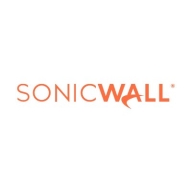


SonicWall NSa and Azure Firewall compete in the network security category. SonicWall NSa seems to have the upper hand with deployment flexibility and security features, while Azure Firewall shines with integration and scalability in Microsoft environments.
Features: SonicWall NSa offers high-performance threat protection, advanced security services, and granular control over network traffic. Users value its robust VPN capabilities and deep packet inspection. Azure Firewall is noted for seamless Azure integration, auto-scaling, and threat intelligence-based filtering, making it highly suitable for Microsoft-centric environments.
Room for Improvement: Users suggest SonicWall NSa could benefit from better reporting tools, streamlined firmware updates, and enhanced user interface. Azure Firewall users need better documentation, more intuitive rule management, and improved user training.
Ease of Deployment and Customer Service: SonicWall NSa users find its setup straightforward and customer support reliable. Azure Firewall benefits from easy integration within Azure environments and Microsoft’s comprehensive support.
Pricing and ROI: SonicWall NSa offers good value with competitive upfront costs and strong ROI. Azure Firewall’s pricing is higher but justified by scalable and comprehensive cloud-native firewall capabilities, valued by users already embedded in Azure ecosystems.
Clients are now comfortable and not wasting productive hours on IT support.
The automation part is giving us a cost benefit and speed; we can react faster.
It's a very useful tool to mitigate and protect your enterprise.
With Azure Firewall on the cloud, you just need to subscribe to the firewall, configure it, and it will help you protect your environment.
We had budgeted about thirty lakhs, but after negotiating with SonicWall NSa, we saved almost ten lakh rupees in a year.
The quick resolution of issues with Fortinet FortiGate is due to the support of the company and the fact that the equipment is easy to work with.
I would rate the technical support for Fortinet FortiGate a ten out of ten.
As a solution provider, when I encounter problems, I connect directly with Fortinet support, and they provide solutions within a very short time.
Microsoft provides excellent customer support, especially with premium support plans.
Nevertheless, the final support from Microsoft remains effective.
With Azure products, customer support is really good.
SonicWall support is always available to help us on an immediate basis.
The support from SonicWall was excellent.
SonicWall support is very helpful and responsive.
They scale up really well from smaller models like the FortiGate 40 and 50 to bigger sites with the FortiGate 100 for more throughput - up to enterprise datacenters.
The variation comes in terms of the interfaces and throughputs, but from a security perspective, you get the same benefit, irrespective of whether you have an entry-level unit or an enterprise.
We determine sizing based on multiple factors: number of users, available links, traffic types, server count, services in use, and whether services will be published.
Based on my experience, I would rate it nine out of ten for scalability.
Azure Firewall is highly scalable, and I would give it a scalability rating of nine out of ten.
When we started deploying the solution, it was not a mature product at times.
I would rate its scalability around eight out of ten, meaning there are no issues, and it is pretty easy to scale.
Regarding scalability, it's important to ascertain the customer's future requirements, as firewalls need to be sized according to their expected scalability, such as moving from 500 users today to more in the coming years.
SonicWall NSa is very supportive and capable of handling everything from smaller organizations to big enterprise-level organizations on a model-wise or configuration-wise basis.
We're experiencing 99.999% availability consistently.
I would rate the stability of Fortinet FortiGate a ten out of ten.
Currently, we are experiencing a general outage of one of the main internet service providers of the Dominican Republic, and we have not been impacted in our operations because with SD-WAN, we have another internet service provider and we are working with the second WAN connection without any disruption.
The stability of Azure Firewall is excellent.
For our use case, Azure Firewall is stable enough.
Configuration changes have been made that have reduced that latency.
The stability of SonicWall NSA is quite good.
These sessions should be around five to ten minutes long, allowing users and partners to quickly grasp the information without disrupting their daily tasks.
The solution should be able to implement machine learning and analytics of all the logs for threat detection and protection.
It would be better for customers to get immediate replacements even with a standard subscription.
If Azure Firewall can integrate identity features, it will help deliver additional next-generation capabilities.
Improvement in reporting and better visibility into network traffic would also be beneficial.
Azure Firewall could improve its reporting capabilities.
More details in the analytical tools offered would be appreciated since it is not yet mature.
At those times, the CPU spikes considerably, and due to that, the firewall response becomes slow.
There are some aspects of the dashboard configuration or customization that could be improved.
Last year, I renewed the support for three years, which can sometimes be expensive but depends on the security benefits and how it helps us.
It offers cost savings as it is generally cheaper than the competition.
It is about 20% cheaper.
The standard functionality for API Management is at a zero level, and then the next level is one.
Azure Firewall is quite expensive, with a high cost.
Azure Firewall is subscription-based, which is advantageous as there is no need for upfront payment.
SonicWall is much cheaper compared to Fortinet, particularly regarding renewal and licensing costs.
I would rate the price of the product as seven out of ten.
These features help reduce our downtime, manage the ISPs, and deploy SLAs for all the website traffic.
The most valuable feature of FortiGate is FortiView which provides proactive monitoring.
We got a firewall and gave an SSL VPN to my client to connect to their servers, after which, such kind of activities involving ransomware attacks stopped.
We have to combine multiple features and multiple products, and then we can say that this is more cost-effective and works properly to ensure the security posture of our cloud deployments.
With Azure Firewall on the cloud, you just need to subscribe to the firewall, configure it, and it will help you protect your environment.
The premium version includes all traditional firewall features, reducing the need for separate compute resources.
Real-time deep memory inspection is very helpful and has had a positive impact on our security posture.
SonicWall NSA's most valuable features are its SD-WAN and a system RTBI that blocks all attacks.
We were the only organization that remained secure with a zero infection rate.
| Product | Market Share (%) |
|---|---|
| Fortinet FortiGate | 18.7% |
| Azure Firewall | 2.2% |
| SonicWall NSa | 1.7% |
| Other | 77.4% |


| Company Size | Count |
|---|---|
| Small Business | 357 |
| Midsize Enterprise | 133 |
| Large Enterprise | 188 |
| Company Size | Count |
|---|---|
| Small Business | 12 |
| Midsize Enterprise | 12 |
| Large Enterprise | 22 |
| Company Size | Count |
|---|---|
| Small Business | 54 |
| Midsize Enterprise | 22 |
| Large Enterprise | 24 |
Fortinet FortiGate is a versatile network security tool offering features like VPN, firewall, web filtering, intrusion prevention, and scalability. It is known for its performance and integration with other Fortinet products, making it a preferred choice for robust cybersecurity.
Fortinet FortiGate stands out as a comprehensive cybersecurity solution with strong performance and ease of configuration. It delivers unified threat management, integrating features such as dynamic routing, SD-WAN support, and centralized management. Despite its strengths, improvements in the web interface's stability, pricing structures, and reporting capabilities are needed. Users seek better integration with third-party tools and automation advancements to enhance the experience further. These enhancements, alongside improvements in bandwidth management and the reduction of licensing costs, are points of interest for users looking to capitalize on FortiGate's extensive capabilities.
What are Fortinet FortiGate's key features?Fortinet FortiGate is widely implemented across industries as a primary firewall system for securing internet gateways and safeguarding data centers. It supports businesses in achieving SD-WAN integration and enhances cybersecurity by providing essential features like antivirus, web filtering, and application control. Enterprises utilize FortiGate for securing remote connections and ensuring compliance with security standards, making it adaptable for different network sizes and industries.
Azure Firewall is a user-friendly, intuitive, cloud-native firewall security solution that provides top-of-the-industry threat protection for all your Azure Virtual Network resources. Azure Firewall is constantly and thoroughly analyzing all traffic and data packets, making it a very valuable and secure fully stateful firewall as a service with built-in high availability and unrestricted cloud scalability. Azure Firewall allows users to create virtual IP addresses and provides for secure DDoS protection for the virtual machines on your network. It also provides fast and efficient east-west and north-south traffic security.
Azure Firewall is a managed, cloud-based network security service built to protect your Azure Virtual Network resources. It is a fully stateful firewall as a service with built-in high availability and unrestricted cloud scalability.
Azure Firewall has two significant offerings, Standard and Premium.
Azure Firewall Standard works directly with Microsoft Cyber Security and supplies excellent L3-L7 filtering and threat awareness. The proactive real-time threat awareness will quickly alert you and immediately deny all traffic to and from any known problematic or suspicious domains or IP addresses. Microsoft Cyber Security is updated continually to protect against all new and known potential threats at all times. To learn more about Azure Firewall Standard, click here.
Azure Firewall Premium provides everything the standard version does, and additionally adds extra levels of data encryption, network intrusion detection, extended URL filtering, and Web category filters. To learn more about the added features of Azure Firewall Premium, click here.
Key Benefits and Features of Azure Firewall:
What our real users have to say:
Many PeerSpot users found Azure Firewall to be very user-friendly and easy to use. They liked that it offers seamless integration to the cloud and were especially pleased with the threat filtering options.
Regarding integration and threat intelligence, our users wrote:
“The most valuable feature is the integration into the overall cloud platform.”
SonicWall NSa dispenses advanced threat protection using a high-performance security platform. The NSa series implements intuitive deep learning technologies in the SonicWall Capture Cloud Platform to dispatch the automated real-time threat detection and deterrence enterprise organizations need today. SonicWall Network Security appliance (NSa) series is best for mid-sized organizations to distributed enterprises and data centers.
SonicWall NSa series next-generation firewalls (NFGWS) combine two very robust security ideologies to deliver advanced threat protection to keep users’ networks safe. Boosting SonicWall’s multi-engine advanced threat protection (ATP) is their Real-time Deep Memory Inspection (RTDMI™). The RTDMI intuitively identifies and stops aggressive zero-day threats and vicious malware by investigating memory directly. This real-time process allows SonicWall RTDMI to be accurate, lessen false positives and discover and alleviate malicious threats and attacks. SonicWall’s single-pass Reassembly-Free Deep Packet Inspection (RFDPI) will audit every byte of each and every packet by investigating both outbound and inbound traffic on the firewall. By combining the SonicWall Capture Cloud Platform along with on-box offerings such as intrusion prevention, web/URL filtering, and anti-malware, the NSa series is able to block the most malicious and dangerous threats at the gateway.
Additionally, SonicWall firewalls supply absolute protection by executing complete inspection and decryption of SSH and TLS/SSL encryption connections - no matter the port or protocol. The firewall takes a deep dive into each and every packet (the header and data) routing out any anomalies, zero-day intrusions, threats, and protocol non-compliance. Users can also define unique criteria specific to their organization to ensure their networks remain safe. This aggressive deep packet inspection is able to identify and block malicious attacks, stop dangerous malware downloads, prevent the spread of infections, and defeat command and control (C&C) communications and data exfiltration. Protocols involving inclusion and exclusion allow users complete control to decide, based on specific governance policies, organizational policies, or government or legal compliance, which traffic is to be investigated for decryption or inspection.
SonicWall Nsa offers enterprise organizations the network control and fluid flexibility they desire using an intrusion prevention system (IPS), VPN, real-time visualization, and other advanced powerful security features, making it a popular firewall solution in today's marketplace.
Reviews from Real Users
“The features that I have found most valuable are the firewalling, which is very good, and the GUI which is very intuitive. It is easy to use and provides great security.” - Network Engineer at a maritime company
“What's valuable in SonicWall NSa is the ATP (advanced threat protection). It can protect users from malicious links. SonicWall NSa also has a Sandboxing service that is very helpful for us, especially when end users accidentally click on malicious links. Another valuable feature of this solution is that it is very useful for site-to-site VPN connectivity issues. SonicWall NSa has very good hardware. I also love that SonicWall has very good technical support, who are very knowledgeable, provide good suggestions, and they're easy to reach.” - Mohammed M., Network Administrator at Transgulf Readymix
We monitor all Firewalls reviews to prevent fraudulent reviews and keep review quality high. We do not post reviews by company employees or direct competitors. We validate each review for authenticity via cross-reference with LinkedIn, and personal follow-up with the reviewer when necessary.